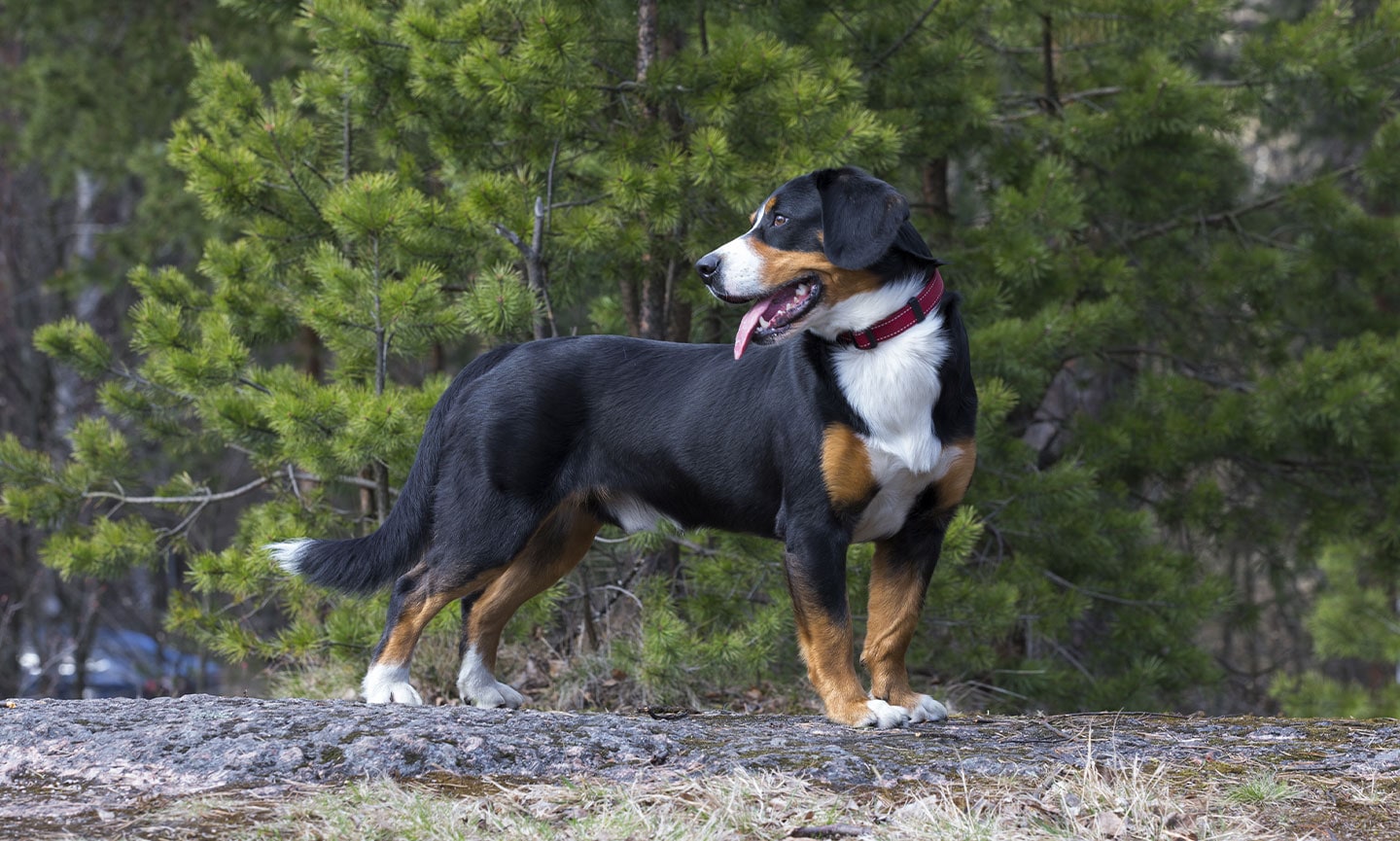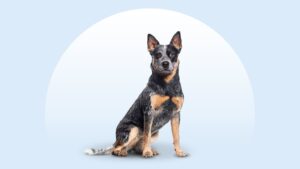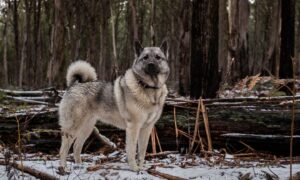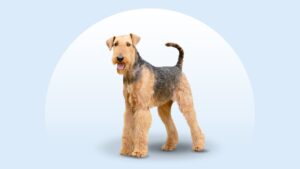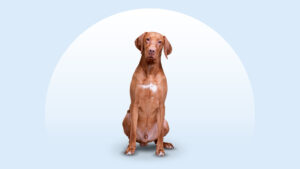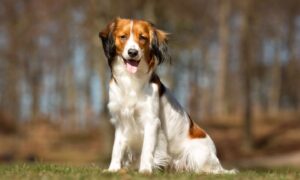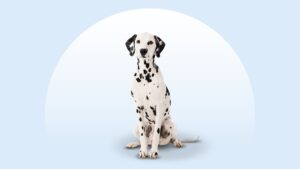Entlebucher Mountain Dog
Updated December 15, 2025
Entlebucher Mountain Dog
Updated December 15, 2025
The Entlebucher Mountain Dog is a Swiss working breed who loves to be on the go. Smart and active, they excel at obedience training—but they need plenty of outlets for their boundless energy.
Devoted, Energetic, Smart
Male: 50-65 pounds
Female: 40-55 pounds
Male: 17-21 inches
Female: 16-20 inches
11 to 13 years
Black, Tri-color
Remember the all-around good student at school who also shined at sports? That’s the Entlebucher Mountain Dog for you: an overachiever. Their work ethic is relentless, they’re the star of every puppy class and they excel at everything—except doing nothing. And that’s where your own stamina comes in because you need to provide this pup with a constant stream of mental stimulation and exercise—or they’ll take matters into their own paws to find an outlet for all that energy. Be prepared to go on runs, hikes and bike rides together—or train them in agility. We know you’ve got it in you—you’re no couch potato yourself!
Entlebucher Mountain Dog Characteristics
Entlebucher Mountain Dog Appearance
The Entlebucher Mountain Dog (aka the Entlebucher Sennenhund) is the smallest of the four tri-colored Swiss Mountain Dogs (they look a bit like the Bernese Mountain Dog and the Greater Swiss Mountain Dog but more compact in form). But don’t let the Entlebucher Mountain Dog’s size or short, sturdy legs fool you: These are strongly muscled cattle dogs who can knock you flat if you let their enthusiasm as young pups run wild. Entles have short and shiny coats with tan and white symmetrical markings on a mostly black base, and their expression is always alert and friendly.
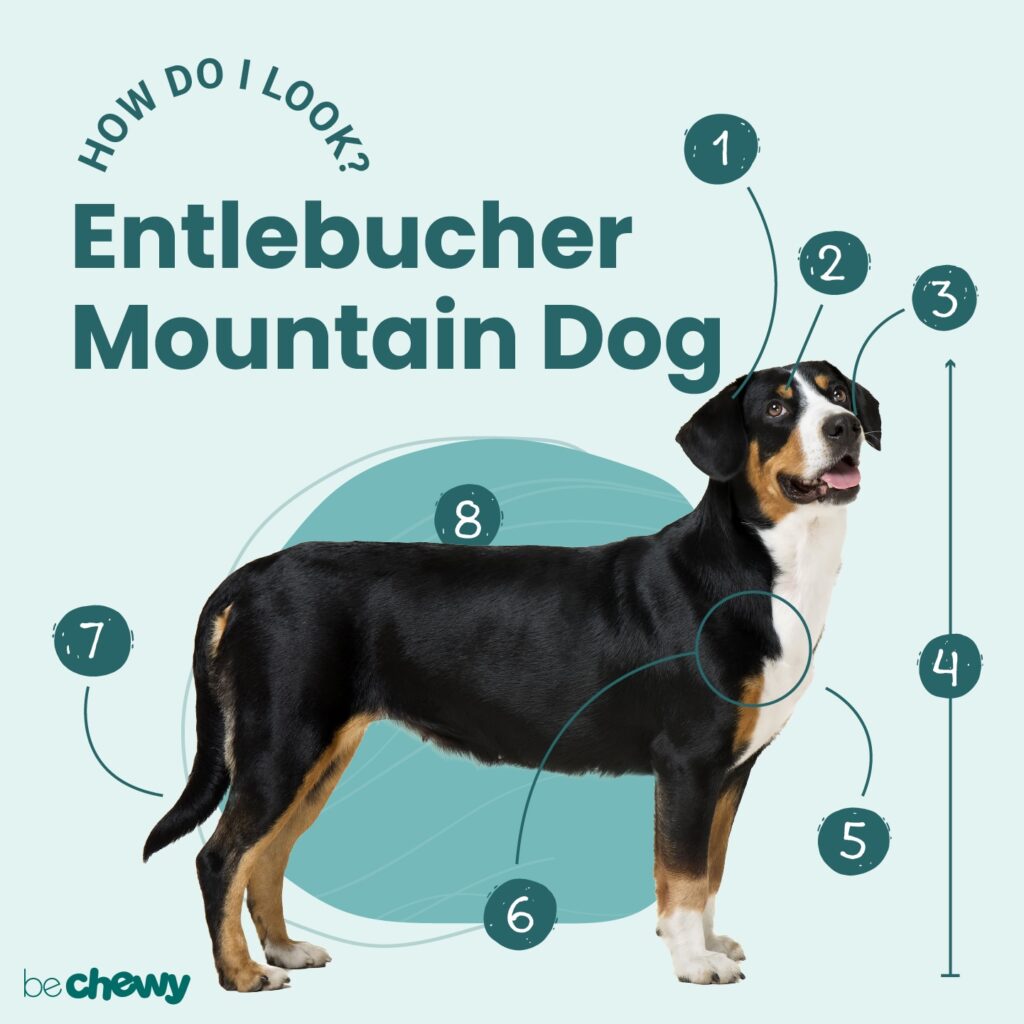
- Ears
The Entlebucher Mountain Dog's ears aren't too big, and they're set high and wide. Their flaps hang down and are triangular with rounded tips.
- Eyes
Their eyes are always brown—the darker, the better. They are almond-shaped with black pigmented rims, and they tend to be on the small side.
- Nose
Entlebuchers have black noses.
- Coat Length
Entlebuchers have a double coat with a close-fitting short top coat that's thick, shiny and dense with a thick undercoat.
- Coat Color
Entlebucher Mountain Dogs' coats come in either black or tri-color. If tri-color, black is the base coat color with white and tan or yellow markings that are as symmetrical as possible.
- Tail
The AKC breed standard allows for the tail to be docked or undocked. Docking involves cutting a portion of the dog’s tail off when they are puppies. Veterinary groups along with many U.S. states and countries have banned this procedure due to medical and behavioral reasons. If you are interested in this procedure, schedule a consultation with your veterinarian. If the tail is left undocked, it can be elevated while moving, but should never curl over their back.
Entlebucher Mountain Dog Temperament
Entlebucher Mountain Dogs are so loyal and devoted that they won’t leave your side for the next 13 years or so—seriously, they’ll want to be with you 24/7. Bred to watch over cattle day and night, one of their most well-known traits is their need to be busy. These pups are at their happiest when mentally stimulated, and they want to be busy with their dog parents. If you don’t give them something to do, they’ll find activities all on their own—and you might not like what they pick.
For this reason, their temperament might not be everyone’s cup of tea—especially for those with couch potato tendencies—but for a pet parent with an active lifestyle, the “Swiss Army knife” of the dog world makes an excellent companion dog.
Entlebuchers are very bright dogs, meaning you can train them to do practically anything—which is where the Swiss Army knife reference comes from. But early socialization is vital for the breed. They tend to be aloof when they first meet someone, and they may be suspicious of strangers. They often prefer people don’t pet them when they first meet them; they won’t snarl or growl—they’re very polite—but they’re not thrilled to be petted as a Labrador would be. If properly socialized, Entles do warm up quickly to other people—within minutes—so they can be social dogs, just perhaps not social butterflies.
Entlebucher Mountain Dogs are good with kids once they’re properly trained and socialized, but Entlebucher puppies love to play rough, so they don’t make the best of companions for the littles. They’re best suited for a household with older kids. They’re not known for biting; rather, they’re a drover breed, bred to drive the herd with their shoulders, so they might just run into you and knock you flat. (Again, socialization and training is key!) The Entlebucher breed is great with other animals from their household, and, as their pet parent, you might find yourself with more than one Entle in your life.
Entles are not what you’d call an easy-going breed; they have a high drive and are a bit more high strung than other dogs, but they are less of a challenge for someone who understands canines in general. Active pet parents with some dog savvy are bound to love the Entlebucher Mountain Dog’s personality.
How to Care for a Entlebucher Mountain Dog
The Entlebucher Mountain Dog breed will thrive if you give them something to do—from agility and conformation (dog shows) to working as therapy dogs—and even more so if it means spending time with you. Entles need a moderate amount of consistent daily exercise, but they need more mental stimulation than the average dog. Not to repeat ourselves, but this breed really need things to do, and if you don’t meet this need, you can bet an Entle will find something to do all on their own. (Gulp!)
Grooming
Training
Diet
Exercise
Environment
Entlebucher Mountain Dog Health
The Entlebucher Mountain Dog has a lifespan of 11 to 13 years and doesn’t have many health issues. While they’re typically very healthy dogs, knowing the most common health concerns for the breed can help your pup live the longest life possible.
- Hip Dysplasia: Hip dysplasia is a genetic disease affecting many large breeds. It’s a deformity that occurs during growth and can be affected by factors such as diet and exercise. For this reason, it’s important to watch your Entlebucher Mountain Dog’s weight. Hip evaluations should be performed on young dogs—4 to 6 months old—as early diagnosis can increase the treatment options available, such as surgical procedures that can only be performed on pups. Besides weight control and surgery, treatments to make your Entle’s life more comfortable include medication to alleviate stiffness and pain and acupuncture.
- Luxating Patella: A luxating patella is a kneecap that moves out of its normal location. Pet parents may notice their pup skipping a step or running on three legs, only to go back to normal a few seconds later. A luxating patella may require surgery if it is causing discomfort, although some dogs tolerate the condition without surgical correction.
- Eye Conditions: Some of the most serious eye conditions that affect all dogs can also be present in the Entlebucher, such as progressive retinal atrophy (PRA), a hereditary eye disease that causes blindness; glaucoma, which results in increased pressure in the eye; and cataracts, where the lens of the eye becomes opaque. NEMDA, the AKC Parent Breed Club for the Entlebucher in North America, requires an annual eye exam certified by a Board Certified Veterinary Ophthalmologist for all breeding dogs and recommends annual eye exams for all pups during their yearly checkups. If you have any concerns, speak with your vet.
- Entlebucher Urinary Syndrome: This is a genetic disease of the urinary system that results in abnormality at the junction of the ureter and the bladder. EUS can cause problems ranging from occasional leaking of urine to renal failure and death. Fortunately, EUS is very uncommon, and when it does occur, urine leaking is the most prevalent manifestation of the disease.
Entlebucher Mountain Dog History
The Entlebucher Mountain Dog’s origin can be traced to the Swiss Alps, more concretely to the valley of the river Entlebuch. Also known as the Entlebuch Cattle Dog, the breed was originally bred to move and guard herds before industrial agriculture came to be. Entles performed many activities, but their primary task was to drive cattle up to high pastures to feed in the summer and back down to the valley for winter. The Entlebucher’s history as an all-around farm dog explains why the breed excels at so many different tasks—there’s no denying that these Entlebucher qualities persist to this day.
During the 1900s, crossbreeding with German Shepherds and the outbreak of World War I almost caused the extinction of the Entlebucher Mountain Dog breed. However, breed standards were developed as the result of the work of several breeders, and an Entlebucher club was formed in Switzerland in 1926. The breed first came to the United States in 1975, and in 2011, the American Kennel Club recognized the Entlebucher Mountain Dog as their 170th breed.
To this day, Entlebuchers are considered a very rare breed. So, where’s the best place to find an Entlebucher Mountain puppy? You can find a list of reputable breeders on the American Kennel Club’s website, but you’ll need to be patient as puppies are not available on demand. Depending on the breeder, a puppy can cost anywhere from $1,000 to $6,000, but the average is $1,200 to $1,400. (The higher cost is for superior pedigrees or breeding rights.) If you’d like to adopt a Entle, contact the National Entlebucher Mountain Dog Association. You can also search Chewy’s database of adoptable dogs in your area, but keep in mind that this rare breed is not commonly found in shelters and rescues.
FAQs
Do Entlebucher Mountain Dogs shed?
Are Entlebucher Mountain Dogs good family dogs?
How big do Entlebucher Mountain Dogs get?
Do Entlebucher Mountain Dogs bark a lot?
Expert input provided by veterinarian Rebecca Hahn, DVM, who is an experienced Entlebucher Mountain Dog breeder at Brunswick Entlebuchers; Jan Vincent, CGC Evaluator with the AKC and seasoned Entlebucher breeder at Adhem Kennel; and Amber Walker, KPA-CTP, zoologist and owner of Animal Intuitions.
Breed characteristic ratings provided by veterinarian Dr. Sarah J. Wooten, DVM, CVJ, a veterinarian at Sheep Draw Veterinary Hospital in Greeley, Colorado; dog trainer and behavior consultant Irith Bloom, CPDT-KSA, CBCC-KA, CDBC, owner of The Sophisticated Dog, LLC, in Los Angeles; and certified animal behavior consultant Amy Shojai, CABC, in Sherman, Texas.
The health content was medically reviewed by Chewy vets.

